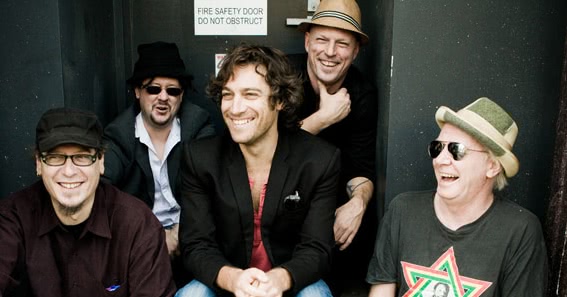There’s a widely held misconception that Jamaican music and reggae music are interchangeable terms, denoting the exact same thing. While reggae is the best-known and perhaps most lucrative form of Jamaican music, it’s just one of many stylistic advents to come out of the Caribbean nation since the 1960s. Next weekend the Factory Theatre will host the One Drop Rankin Riddim festival, depicting the diversity of Jamaican music, as channelled by local musicians.
“There’s so many different variants of it, from dancehall, to rocksteady, to reggae, to ska,” explains King Tide frontman Tony Hughes. “As much as Bob Marley’s the patron saint of reggae music, you don’t necessarily have to do a lot of Bob Marley tunes or bow down to the altar of Bob.”
Sydney’s King Tide will assume headline duties at the festival’s inaugural event. The seven-piece hasn’t reached headliner status simply by being masters of mimicry. Since forming around a decade ago, the band has issued three full-length albums that showcase a unique twist on a variety of Jamaican staples.
“If you listen to all of our previous albums, [the music]’s pretty diverse in its Jamaican music content,” Hughes says. “It’s not just a one drop thing or a ska thing or a rocksteady thing. There’s a lot of soul and pop in our music.”
The first five years of King Tide’s existence were rather prolific, but it’s now five years since their last record, Roots Pop Reggae, came out. So what’s the hold up?
“We just want to make a really good one,” Hughes says. “We had a few false starts and we canned some music. We don’t want to make just an Aussie reggae album. We want to make something different.
“We’re being really honest with ourselves and saying, ‘Well that’s just not good enough.’ We’re trying to get the best out of ourselves. After Roots Pop we just wanted to make a really, really good one.”
Thus far, the only indication of what King Tide’s quest for progress sounds like is the song ‘El Bad Man’, which surfaced this time last year. Hughes allows the BRAG in for a preview of two more tracks from the forthcoming LP. Three artists in particular spring to mind upon hearing them: Sandinista!-era The Clash, early Massive Attack and the debut Gorillazalbum.
“Yes!” he agrees. “If you look at all those acts, they all use a lot of Jamaican music in their make-up, but it’s their compass, it’s not their whole thing. And that’s what we’re aiming at. So we could be cutting our nose to spite the face and lose any fan base that we have, but we’ve got to do it. We have to do it for our own sanity.”
Indeed, King Tide steer clear of getting stuck in stylistic potholes. It was thanks to Bob Marley and The Wailers’ groundbreaking output from the 1960s and 1970s that reggae became a globally celebrated movement. In turn, the music of these legendary artists is inextricably tied in with Rastafari religion. But Hughes says this is a component King Tide resolutely avoid.
“Me personally, I like all the earlier Jamaican music – the rocksteady stuff, which is more soul-influenced, like Delroy Wilson and all those sorts of people. I’m not a huge fan of the Rastafarian elements of reggae music, but that’s because I’m not religious and that would be a contradiction.”
Nevertheless, placing Rastafarianism aside, Hughes admits there’s something about Jamaican music that’s uniquely able to unite people. “I think that good luggage does come with the product, definitely,” he says. “People come to a show and they feel that. There is some sort of spirit there.”
Catch King Tide atOne Drop Rankin Riddim Spring Festalongside The Protesters, The Strides, Kinsky, DK and The Rising Sun, Midnight Tea Party and ForeignDub atFactory Theatre onSaturday September 13, tickets online.

































